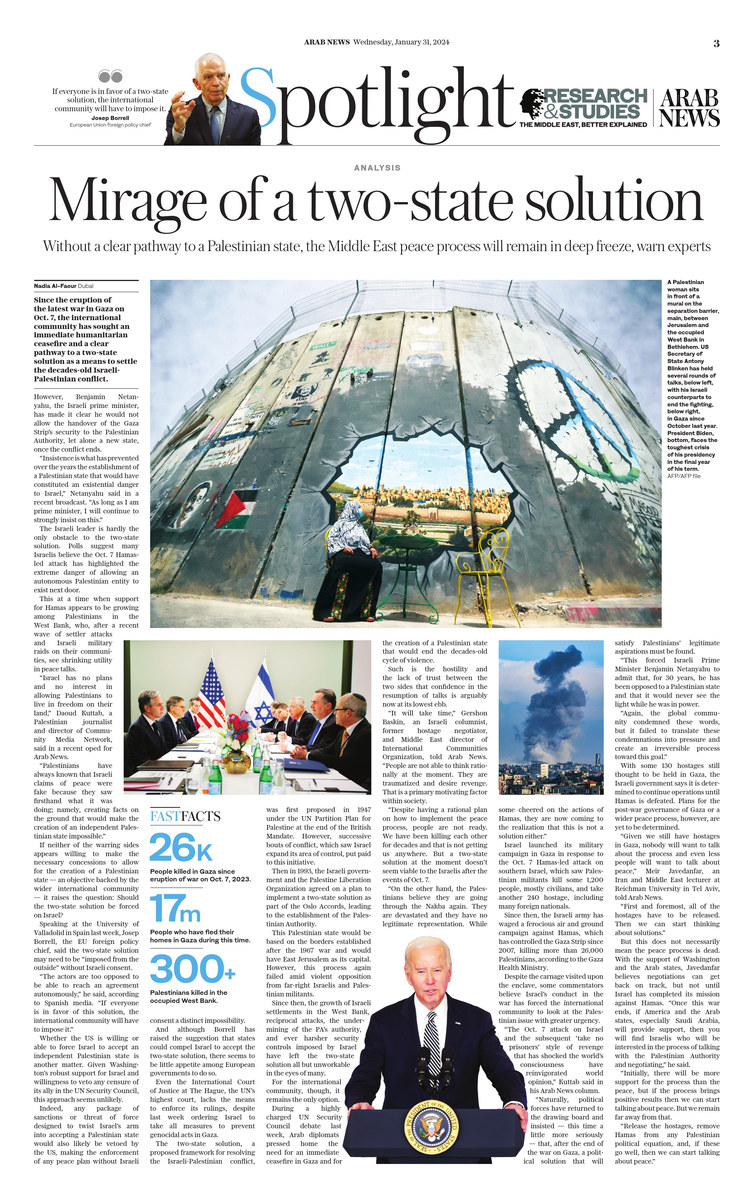DUBAI: Since the eruption of the latest war in Gaza on Oct. 7, the international community has sought an immediate humanitarian ceasefire and a clear pathway to a two-state solution as a means to settle the decades-old Israeli-Palestinian conflict.
However, Benjamin Netanyahu, the Israeli prime minister, has made it clear he would not allow the handover of the Gaza Strip’s security to the Palestinian Authority, let alone a new state, once the conflict ends.
“Insistence is what has prevented over the years the establishment of a Palestinian state that would have constituted an existential danger to Israel,” Netanyahu said in a recent broadcast. “As long as I am prime minister, I will continue to strongly insist on this.”
Responding to Netanyahu’s comments, Antonio Guterres, the UN secretary-general, said this stance “would indefinitely prolong a conflict that has become a major threat to global peace and security,” and that the two-state solution is the only way out of this “hatred and violence.”

A picture shows a view of the Israeli separation wall in Bethlehem city in the occupied West Bank, on December 6, 2023. (AFP)
The Israeli leader is hardly the only obstacle to the two-state solution. Polls suggest many Israelis believe the Oct. 7 Hamas-led attack has highlighted the extreme danger of allowing an autonomous Palestinian entity to exist next door.
This at a time when support for Hamas appears to be growing among Palestinians in the West Bank, who, after a recent wave of settler attacks and Israeli military raids on their communities, see shrinking utility in peace talks.
“Israel has no plans and no interest in allowing Palestinians to live in freedom on their land,” Daoud Kuttab, a Palestinian journalist and director of Community Media Network, said in a recent oped for Arab News.
“Palestinians have always known that Israeli claims of peace were fake because they saw firsthand what it was doing; namely, creating facts on the ground that would make the creation of an independent Palestinian state impossible.”
He added: “Sure, the Israelis give plenty of public support for peace — regularly blaming Palestinians for not being responsive enough, for inciting violence and for refusing to accept the concept of a ‘Jewish state.’
“But in reality, these were smokescreens aimed at fooling the international community.”
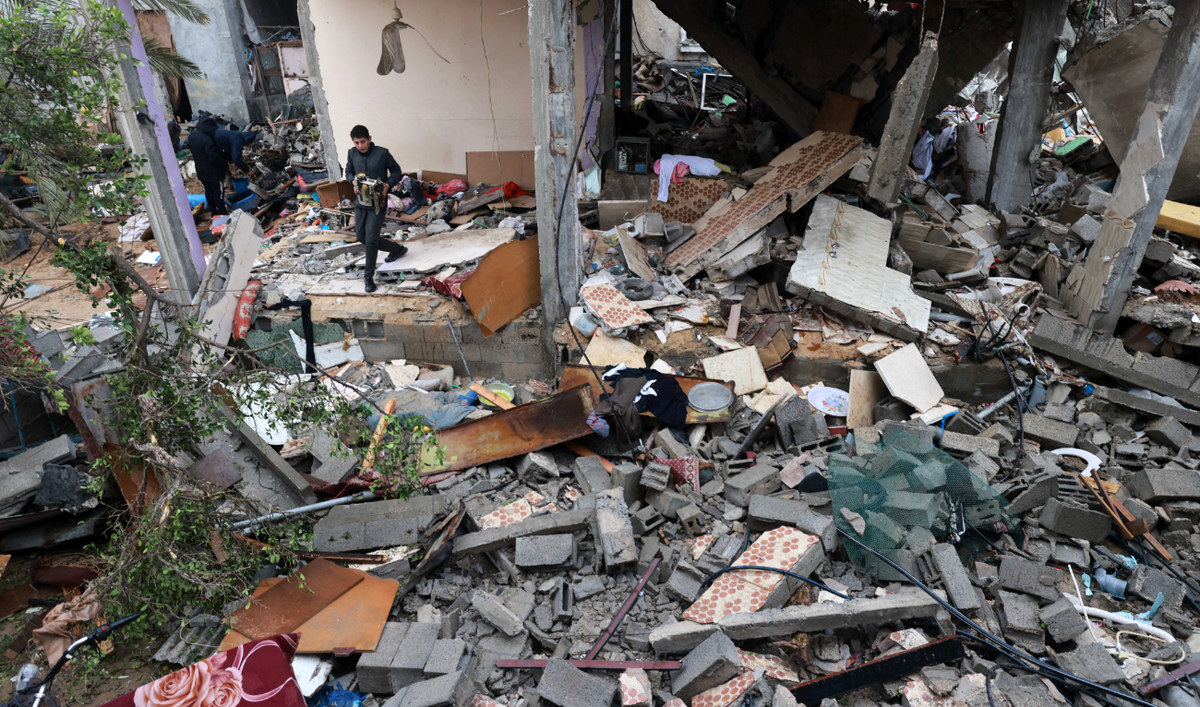
A young man salvages objects amid the rubble of a building destroyed by Israeli bombing in Rafah in the southern Gaza Strip on January 27, 2024. (AFP)
If neither of the warring sides appears willing to make the necessary concessions to allow for the creation of a Palestinian state — an objective backed by the wider international community — it raises the question: Should the two-state solution be forced on Israel?
Speaking at the University of Valladolid in Spain last week, Josep Borrell, the EU foreign policy chief, said the two-state solution may need to be “imposed from the outside” without Israeli consent.
“The actors are too opposed to be able to reach an agreement autonomously,” he said, according to Spanish media. “If everyone is in favor of this solution, the international community will have to impose it.”
Antony Blinken, the US secretary of state, has said repeatedly that the establishment of a Palestinian state with guarantees for Israel’s security is the sole way to bring peace.
“The problem is getting from here to there, and of course, it requires very difficult, challenging decisions. It requires a mindset that is open to that perspective,” Blinken told the World Economic Forum in Davos on Jan. 17.
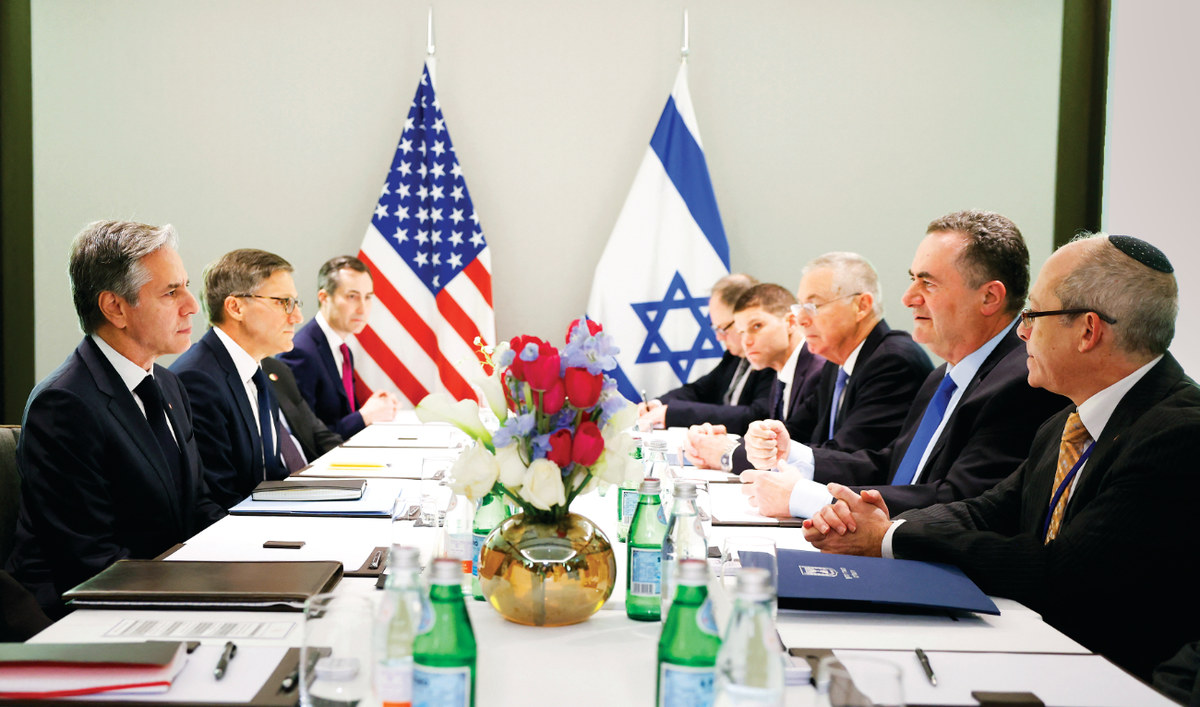
US Secretary of State Antony Blinken (L) meets with Israel’s Foreign Minister Israel Katz (2nd-R) in Tel Aviv on January 9, 2024. (AFP)
Whether the US is willing or able to force Israel to accept an independent Palestinian state is another matter. Given Washington’s robust support for Israel and willingness to veto any censure of its ally in the UN Security Council, this approach seems unlikely.
Indeed, any package of sanctions or threat of force designed to twist Israel’s arm into accepting a Palestinian state would also likely be vetoed by the US, making the enforcement of any peace plan without Israeli consent a distinct impossibility.
And although Borrell has raised the suggestion that states could compel Israel to accept the two-state solution, there seems to be little appetite among European governments to do so.
Even the International Court of Justice at The Hague, the UN’s highest court, lacks the means to enforce its rulings, despite last week ordering Israel to take all measures to prevent genocidal acts in Gaza.
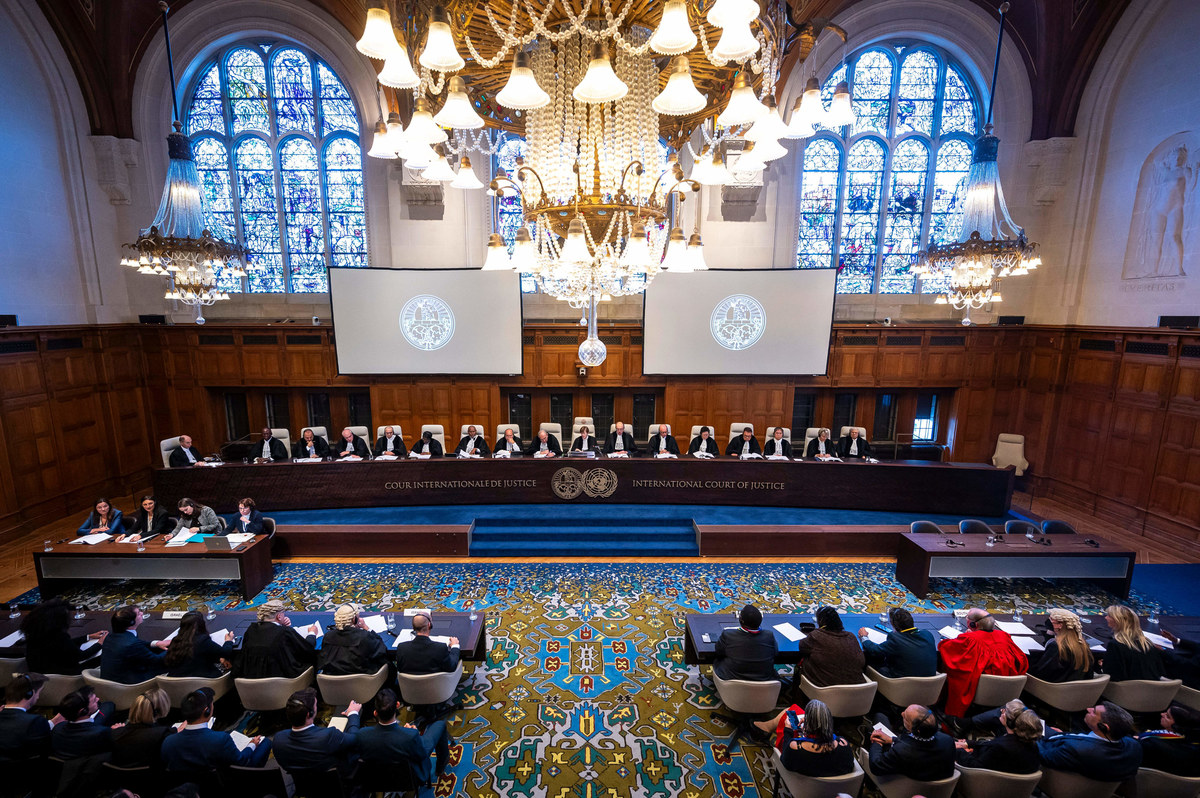
The ICJ on Friday said Israel must prevent genocidal acts in its war with Hamas and allow aid into Gaza. (ICJ)
The two-state solution, a proposed framework for resolving the Israeli-Palestinian conflict, was first proposed in 1947 under the UN Partition Plan for Palestine at the end of the British Mandate. However, successive bouts of conflict, which saw Israel expand its area of control, put paid to this initiative.
Then in 1993, the Israeli government and the Palestine Liberation Organization agreed on a plan to implement a two-state solution as part of the Oslo Accords, leading to the establishment of the Palestinian Authority.
This Palestinian state would be based on the borders established after the 1967 war and would have East Jerusalem as its capital. However, this process again failed amid violent opposition from far-right Israelis and Palestinian militants.
Since then, the growth of Israeli settlements in the West Bank, reciprocal attacks, the undermining of the PA’s authority, and ever harsher security controls imposed by Israel have left the two-state solution all but unworkable in the eyes of many.
For the international community, though, it remains the only option.
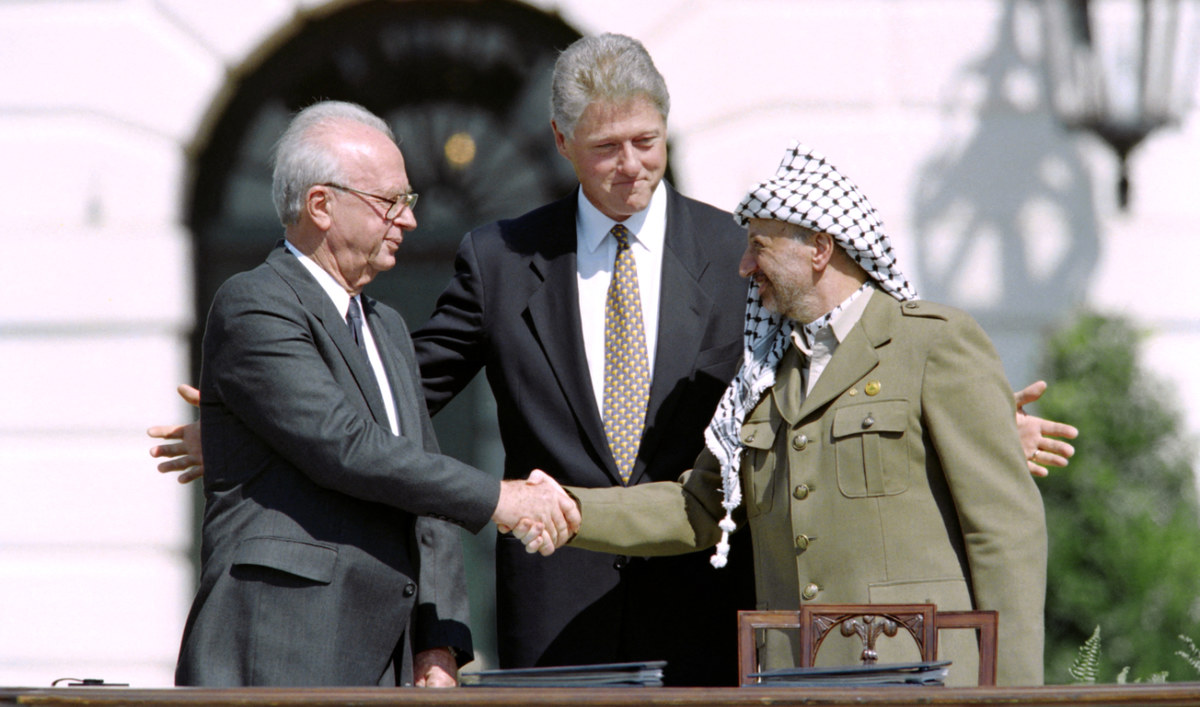
US President Bill Clinton (C) stands between Yasser Arafat (R) and Israeli Prime Minister Yitzahk Rabin (L) as they shake hands for the first time, on September 13, 1993 at the White House after signing the historic Israel-PLO Oslo Accords on Palestinian autonomy in the occupied territories. (AFP/File)
During a highly charged UN Security Council debate last week, Arab diplomats pressed home the need for an immediate ceasefire in Gaza and for the creation of a Palestinian state that would end the decades-old cycle of violence.
Lana Zaki Nusseibeh, the UAE ambassador to the UN, told the chamber: “We will not support a return to the failed status quo. Before, the two-state solution was the end point to where we envisioned our diplomatic efforts would lead. Now it must be our starting point.”
Ayman Safadi, the foreign minister of Jordan, said Israel’s actions in Gaza were undermining the two-state solution and were “dooming the future of the region to more conflicts and more war.”
When Gilad Erdan, Israel’s envoy to the UN, likened the world’s handling of the crisis in Gaza to “treating cancer with an aspirin,” many Arab ambassadors walked out of the session.
Such is the hostility and the lack of trust between the two sides that confidence in the resumption of talks is arguably now at its lowest ebb.
“It will take time,” Gershon Baskin, an Israeli columnist, former hostage negotiator, and Middle East director of International Communities Organization, told Arab News. “People are not able to think rationally at the moment. They are traumatized and desire revenge. That is a primary motivating factor within society.
“Despite having a rational plan on how to implement the peace process, people are not ready. We have been killing each other for decades and that is not getting us anywhere. But a two-state solution at the moment doesn’t seem viable to the Israelis after the events of Oct. 7.
“On the other hand, the Palestinians believe they are going through the Nakba again. They are devastated and they have no legitimate representation. While some cheered on the actions of Hamas, they are now coming to the realization that this is not a solution either.”
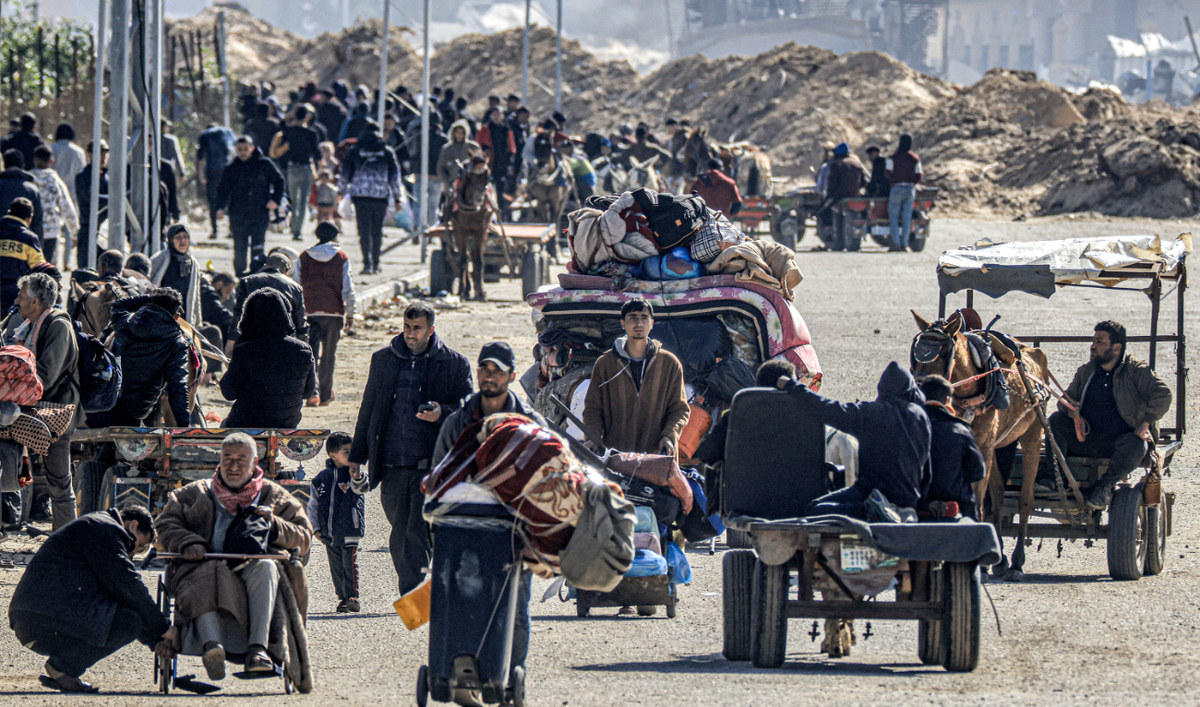
Displaced Palestinians flee from Khan Yunis in the southern Gaza Strip on January 30, 2024. (AFP)
Israel launched its military campaign in Gaza in response to the Oct. 7 Hamas-led attack on southern Israel, which saw Palestinian militants kill some 1,200 people, mostly civilians, and take another 240 hostage, including many foreign nationals.
Since then, the Israeli army has waged a ferocious air and ground campaign against Hamas, which has controlled the Gaza Strip since 2007, killing more than 26,000 Palestinians, according to the Gaza Health Ministry.
Despite the carnage witnessed by the enclave, some commentators believe Israel’s conduct in the war has forced the international community to look at the Palestinian issue with greater urgency.
“The Oct. 7 attack on Israel and the subsequent ‘take no prisoners’ style of revenge that has shocked the world’s consciousness have reinvigorated world opinion,” Kuttab said in his Arab News column.
“Naturally, political forces have returned to the drawing board and insisted — this time a little more seriously — that, after the end of the war on Gaza, a political solution that will satisfy Palestinians’ legitimate aspirations must be found.
“This forced Israeli Prime Minister Benjamin Netanyahu to admit that, for 30 years, he has been opposed to a Palestinian state and that it would never see the light while he was in power.
“Again, the global community condemned these words, but it failed to translate these condemnations into pressure and create an irreversible process toward this goal.”
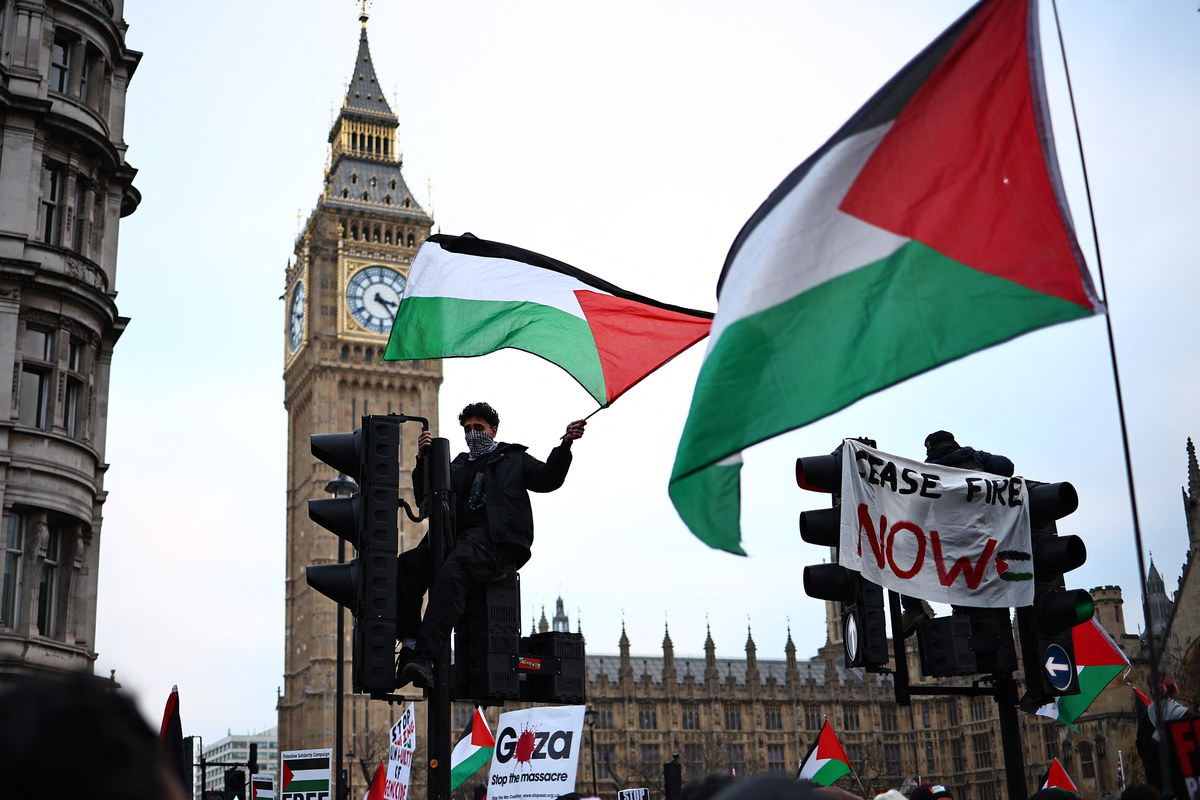
A pro-Palestinian supporter waves a Palestinian flag while sitting on a set of traffic lights in front of the Elizabeth Tower, at the Palace of Westminster, during a National March for Palestine in central London on January 13, 2024. (AFP)
With some 130 hostages still thought to be held in Gaza, the Israeli government says it is determined to continue operations until Hamas is defeated. Plans for the post-war governance of Gaza or a wider peace process, however, are yet to be determined.
“Given we still have hostages in Gaza, nobody will want to talk about the process and even less people will want to talk about peace,” Meir Javedanfar, an Iran and Middle East lecturer at Reichman University in Tel Aviv, told Arab News.
“First and foremost, all of the hostages have to be released. Then we can start thinking about solutions.”
But this does not necessarily mean the peace process is dead. With the support of Washington and the Arab states, Javedanfar believes negotiations can get back on track, but not until Israel has completed its mission against Hamas.
“Once this war ends, if America and the Arab states, especially Saudi Arabia, will provide support, then you will find Israelis who will be interested in the process of talking with the Palestinian Authority and negotiating,” he said.
“Initially, there will be more support for the process than the peace, but if the process brings positive results then we can start talking about peace. But we remain far away from that.
“Release the hostages, remove Hamas from any Palestinian political equation, and, if these go well, then we can start talking about peace.”

Police stand as Israeli demonstrators shout slogans against Prime Minister Benjamin Netanyahu during an anti-government protest in Jerusalem on November 4, 2023. (AFP)
While Netanyahu remains in office, the dial is unlikely to move on Palestinian statehood. That being said, the Israeli prime minister is now facing the political fight of his life.
With rivals trying to pin responsibility on him for intelligence failures leading to the Oct. 7 attacks and for not doing enough to bring the hostages home, he may not be in power long if early elections are called.
But, if Israelis continue to view him as the only candidate capable of standing up to international pressure and the prospect of a Palestinian state, Netanyahu’s political career may yet survive.
Posting on the social media platform X on Jan. 20, just a day after a phone call with US President Joe Biden, Netanyahu said: “I will not compromise on full Israeli security control over the entire area in the west of Jordan — and this is contrary to a Palestinian state.”
For Kuttab, it is up to the international community to prove it is serious about its professed support for the two-state solution.
“The world community has a clear challenge now,” he said. “If it is serious about the two-state solution, it must recognize Palestine and encourage the legitimate representatives of Israel and Palestine to negotiate the modalities as two UN member states.
“Short of that, all efforts must be placed on forcing Israel to grant equal political rights to all the people under its control. Put simply, Israel needs to decide to either share the land or share the power in historic Palestine — there is no third choice.”
